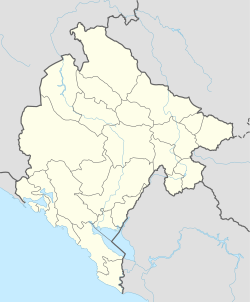Nikšić
|
Nikšić Никшић |
||
|---|---|---|
 |
||
|
||
| Location of Nikšić | ||
| Coordinates: 42°46′48″N 18°56′24″E / 42.78000°N 18.94000°ECoordinates: 42°46′48″N 18°56′24″E / 42.78000°N 18.94000°E | ||
| Country | Montenegro | |
| Founded | 4th century as Anderba and 5th century as Anagastum | |
| Settlements | 110 | |
| Government | ||
| • Mayor | Veselin Grbović | |
| • Ruling party | DPS-SDP-LP | |
| Area | ||
| • Total | 2,065 km2 (797 sq mi) | |
| Population (2011) | ||
| • Total | 56,970 | |
| • Density | 37/km2 (100/sq mi) | |
| • Municipality | 72,443 | |
| Time zone | CET (UTC+1) | |
| • Summer (DST) | CEST (UTC+2) | |
| Postal code | 81400 | |
| Area code | +382 40 | |
| Car plates | NK | |
| ISO 3166-2 code | ME-12 | |
| Website | niksic.me | |
Nikšić (Montenegrin Cyrillic: Никшић, pronounced [nîkʃit͡ɕ]) is the second largest city of Montenegro, with a total population of 57,278, located in the west of the country, in the centre of the spacious Nikšić field at the foot of Mount Trebjesa. It is the center of Nikšić Municipality (Population of 75,282), which is the largest municipality by area and second most inhabited after Podgorica. It is an important industrial, cultural, and educational center.
Nikšić is situated in north-central Montenegro. It is located at the centre of the spacious Nikšić field (Nikšićko polje), a karst plain with an area of 48 km², and an elevation of 640 m AMSL. The plain is surrounded by inhospitable rocky mountainous terrain, a typical landscape of western Montenegro. The city itself is located at the foot of the Trebjesa hill.
Zeta river originates in the Nikšić field, and flows near the city of Nikšić, before it becomes a subterranean river south of the city. The river caused frequent flooding of the plain, until the construction of Hydroelectric power plant Perućica in 1960. The construction of the power plant resulted in creation of three large artificial lakes near the city - Krupac Lake, Slano Lake and Vrtac Lake. Today, the lakes are a popular recreation and relaxation retreats for the citizens of Nikšić.
Under the Köppen climate classification, Nikšić has a humid subtropical climate (Cfa), which is influenced by the Mediterranean climate drying trend during summer. Average temperature for January is 1.3 °C (34.3 °F), while average temperature in July is 21.1 °C (70.0 °F). Average humidity amounts to 68,57%. Nikšić receives 2.245 hours of sunshine per year, with warm and moderately wet summers, and cool and rainy winters. On average, there are 19 days per year with snowfall.
...
Wikipedia


